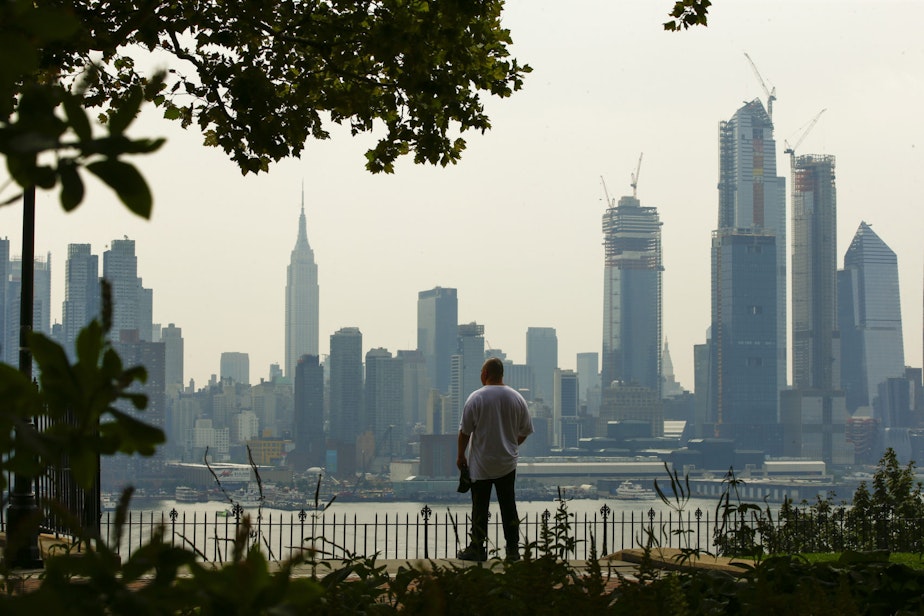New Study Predicts What Climate Your City Could Resemble In 2080

A new study predicts how much warmer 541 cities in the U.S. and Canada will be by 2080.
If climate change continues at its current rate, New York City will feel as warm as northern Arkansas, and Miami’s climate will resemble southern Mexico’s.
Here & Now‘s Robin Young speaks with the study’s lead author, Matt Fitzpatrick, associate professor at the University of Maryland’s Center for Environmental Sciences.
“So you’re talking about sort of the average urban dweller today,” Fitzpatrick explains, “they would need to get in a car, on a train and drive about 500 miles to the south to find a climate today like we expect in their city in 2080.”
On the East Coast, cities will become warmer and wetter, Fitzpatrick says. Washington, D.C., which is normally super muggy in the summer months, will feel more like Mississippi. So what does that mean for Mississippi?
“Mississippi is becoming more like Mexico,” he says.
Sponsored
As scientists looked further south into places like Florida and the Gulf Coast of Texas, Fitzpatrick says they identified what is called a “climate novelty.”
“So what’s happening here is that these cities are changing in such a way that their future climates are unlike anything present in the study area that we looked at,” he says.
Interview Highlights
On how scientists predict climate will change on the West Coast
“The West is a little bit more complicated given the mountain ranges and the complexity of climate. And a lot of places, you know, think like Southern California, so places are getting drier in most seasons, definitely warmer in all seasons.”
Sponsored
On how scientists forecast suspected climate changes
“The basic idea is measuring the similarity and several climate variables between the two places and times. And so we do some statistical methods to measure that similarity, and once we find the location with the highest similarity — or as we would say, the smallest distance in these climate spaces that we’re measuring — that’s what we would call the best analog or the most similar climate.”
On what scientists hope will come of this study
“There’s this big disconnect between the level of concern that scientists have about climate change and the level of concern the general public has. And there’s lots of reasons for that difference in these two groups of people but one of them is communication. And so we often hear things like we expect mean global temperature to go up 3 degrees Fahrenheit. But we don’t experience mean global temperature. We experience a climate in the place we live. So trying to translate what a number like that — that’s very abstract, it’s psychologically distant — into something that people can relate to is the primary goal that we were going for with this study. It’s more local, it’s more personal, and it also, I think, gets across the point that a 3-degree Fahrenheit change in temperature is actually a very very dramatic and rapid change in climate.”
Sponsored
On his response to skeptics who say humans will adapt to climate changes
“Well, I think humans do have a great capacity for adaptation. I think we’re getting to the point that we have multiple stresses on natural systems, and so the ability to just say, ‘We’ll be fine. We’ll adapt,’ maybe, but we also have the potential for some very severe consequences of these changes.”
On what will happen if these climate changes continue
“So I have a daughter who’s 12. In her lifetime, she’s going to experience a dramatic transformation in climate to the point that if my grandchildren lived where I live today, I don’t think they would recognize the climate I’m living in right now in the same place. These are the scales of changes we’re talking about. I’m looking out my window now, there’s piles of snow. Snow is going to become an unusual and rare event in the place that I live if these climate forecasts come to pass. So yeah I mean, it’s going to be a completely different world in terms of climate for kids today.”
Ciku Theuri produced and edited this interview for broadcast with Todd Mundt. Samantha Raphelson adapted it for the web.
This article was originally published on WBUR.org. [Copyright 2019 NPR]
